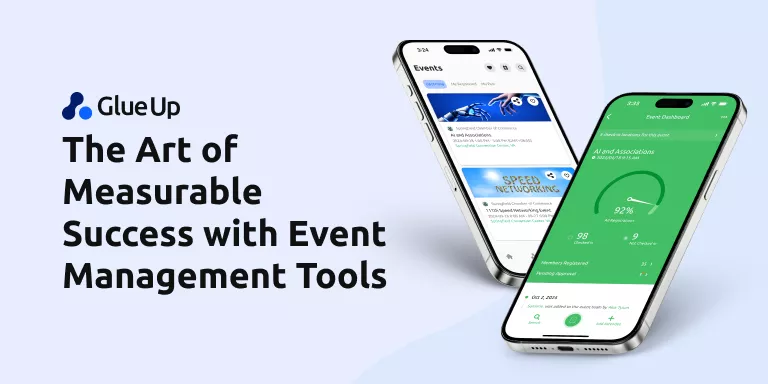
There's FinTech for Finance, MedTech for Medicine, Martech for Marketing.
So Clearly if there's Events, well, there's EventTech.
Quick Reads
Is Event Tech really that big of a deal?
A lot more than you realize.
Events are becoming the go-to engagement point for a lot of companies and organizations, and the ROI involved is palpable. At Glue Up we've drilled into event ROI and its relationship to technology, the correlation is a powerful one. The larger events get, the more content is needed, and the intensity of ROI is not just the number of bodies in an event space, but the engagement that can come from an event.
It's also entirely dependent on the type of goal an event has. Is it ticket sales? Product sales? Intangible marketing value?
Event Tech steps in as a way to take the headache away from the processes needed to make these goals attainable. Whether it be a basic ticketing system, to as precise as heat maps of event spaces for better body-traffic predictions and so on.
Here's a list of Event Tech types to help give you an idea of the wide range of tech that's out there, it's function, and more.
Types of Event Tech
1. Attendee-to-Attendee Chat
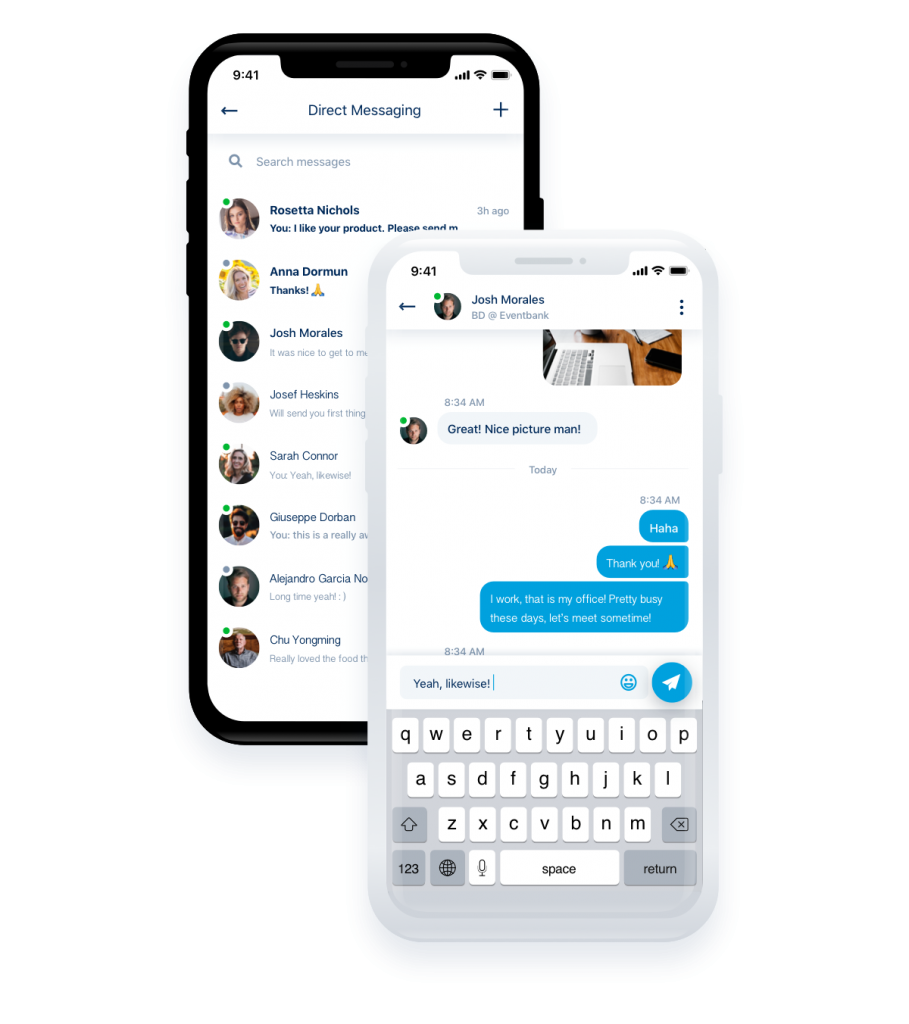
Attendee Chat is a new tool being used at events across the world, particularly for large events with over 500 attendees, and there's just no possible way to physically meet everyone during the entirety of events. With the adoption of smartphones as an every-day use item in the pockets of all of your event-goers, then you're likely going to benefit from attendee-to-attendee chat.
What does it do?
Well, if it wasn't obvious, it's meant to let attendees chat with one another, like a messenger that's specifically for your event and only for those who are registered for it. This helps attendees find and chat with one another at an event without having them meet each other in person. This is also super helpful if you want to drive networking and buzz both before, during, and/or after your event too so attendees can stay in touch, or plan meet-ups prior to events.
However, this does cause a bit of a pandora's box situation. If you allow everyone to find each other in an event with potentially thousands of attendees, people might get bombarded and easily annoyed by conversations coming to their phones. Especially VIPs.
It's very particular that when choosing a provider, they give ample tools to limit or regulate the chatting experience. That means maybe allowing only 5-10 conversations at one time per users, forcing them to delete current conversations should they want to reach out to other event goers. This should help bring down individuals spamming other attendees. There are other things that can help alleviate chat headaches in the future like having VIP only chat, the ability to hide yourself from the chat network, and so on.
It's a game-changing new technology but it must be implemented holistically or else you might end up upsetting and annoying your attendees instead.
2. Venue Marketplaces

This one is a quite straight forward tool. It's simply a marketplace or database of event spaces available for rent for a wide variety of events. These types of tools help event organizers choose event venues in the early stages, and their true value that comes from the marketplace is the in-depth details related to events that call out to event planners and the ability to get venues and events to mingle together.
But did you know that event venues can be projected across the globe? We have a neat article on how one event space can be casted to other physical venues for a true digital event experience.
3. Event Registration Management Tools

Obviously event registration is the most attendee intensive part of any tech implementation in an event, and it's becoming more involved with mobile phones over time, making the process of checking in smoother. Adoption of mobile-first check-ins are a bit slow but ever-growing in the west, while Asia has all but fully adopted the method of QR-code ticket scans to check in at events. The tech is green, easy to use, and highly pliable to different ticket types. This also allows for a smoother online-offline attendee journey tracking.
4. Event Promotion and Email Marketing Tools

Event promotion and email marketing are equally as important to the run-up of the event as it is to the post-event, so it's no surprise that email marketing tools are gracing the desktops of many event managers and organizers. Attractive emails are one thing, but smart emails are another, and it's through smarter email campaigns that can be automated and generated based on the event details save time, target audiences better, and overall make give the digital life of the event a whole new meaning.
While MailChimp and other great email marketing tools do exist, you'll be hard pressed to find them created with the expressive intent of targeting event goers and organizers. And yes, while a beautifully created email campaign works to get customers through the door, it's incredibly difficult to make and it takes time.
Normally, an email campaign would take time and preparation before sending out, but events are hard-hitting, and frequent reminders, invitations, and follow-ups that require a lot of auto-generation and automation to make them effective.
Auto-generation comes from the tool's ability to understand what's going on in the event, the content used, and to re-create it into a beautifully professional email that's sure to convert target audiences into attendee audiences.
This is a rare product on the market and fortunately, at Glue Up we're one of the few who do endeavor to make this email marketing leap with our event management platform. By natively integrating our event management module to the email marketing tool, you'll be able to generate professional and beautiful looking EDMs with just a few clicks and very little work from your end.
The tool simply takes what's already been used in the event's web page and generates an email with it. Invite speakers, attendees, press, or follow up to attendees who were there, or not there for further marketing value.
5. Event Website Builders
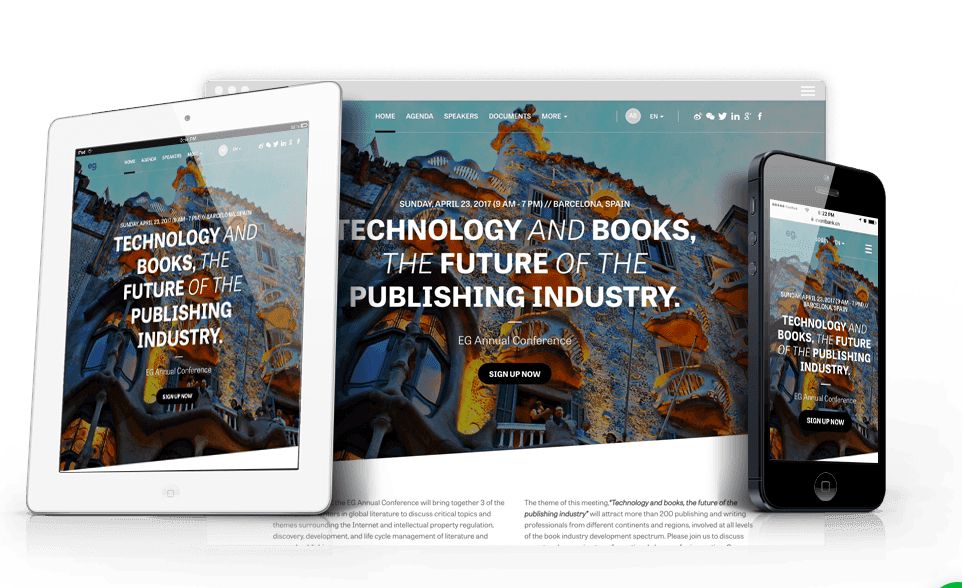
Event website builders are simply drag & drop website builders that are specifically for events. Whenever you imagine yourself needing a landing page for your event, it can tend to be a pain.
Event pages need to be like a blog, easily created, and always updating and kept up to date. That means the page needs to be flexible enough to look good while still compiling your events into one place, as well as collecting all the event landing pages in an easily searchable home page area.
Your event's digital lifespan will exist in this portion of your event strategy, and it's the place where online registrations take place, so it's an extremely important area of event management that needs to be both attractive and functional. There's a lot of choices out there, but as most event planners are not web developers, it's best to find a drag & drop solution that helps you build a website in minutes with great templates.
We even have a comparison of some tools here. Check it out!
6. Live Surveys and Polls
Live survey and polls are a great way to get large audiences engages who would have otherwise not had a voice in the discussion on stage. There are a few niche providers for this function, like sli.do, but it's a growing demand as it lets the lifespan of speakers on stage extend beyond prepared statements and will essentially become its own event type. Audiences will be able to interact with questions asked by speakers, and it's through this that events can take on a new life.
The issue involved is encouraging attendees to take a controlled from the event to make their answers known in real time. Like a clicker that tracks their answers in A,B,C,D style multiple choice answers. Alternatively, a smartphone app can be used but that's seemingly more difficult than handing an attendee a remote, as it's tough to track down all attendees and encourage them to download an app on their phone in the run-up, or during the event.
7. Networking Platforms
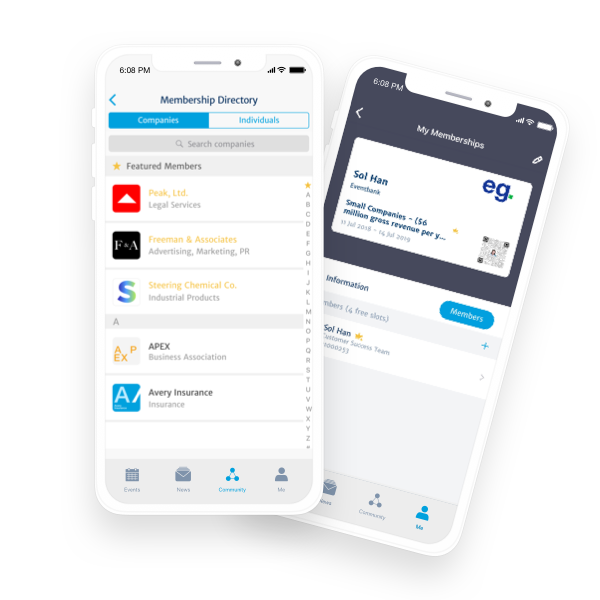
networking platforms are simply communities that are based online. Imagine if your audience has separate interests, even if your event has a topic they're all interested in. Industries, communities, and other interest groups could converge and communicate in their own networking platforms so they can make the most value of their event.
This networking type platform makes it easier as well for networking individuals to get in contact with another attendee or speaker without taking their time from the event or if they're otherwise too busy to meet attendees in the crowd.
That platforms give people as well an opportunity to grab contact info without breaking up meaningful conversations being had at an event, leaving less business developers entering the space and ruining the mood.
8. Event Analytics and Actionable Insights
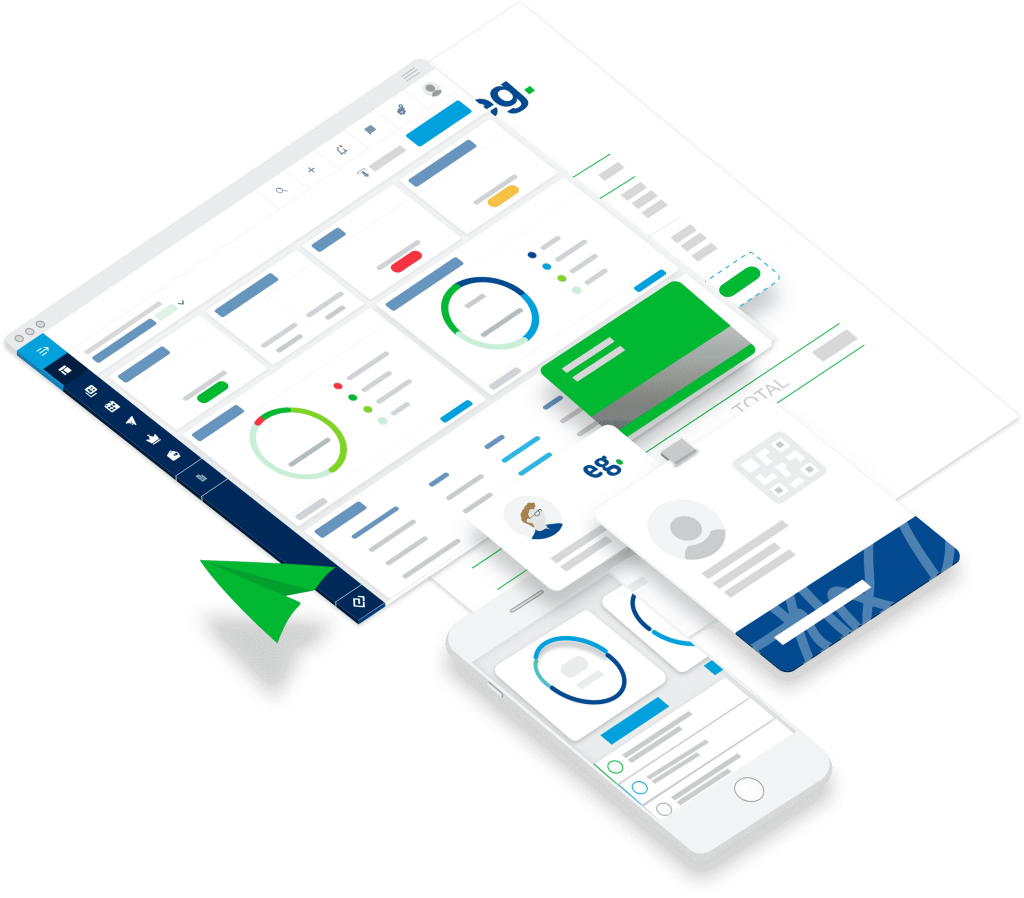 Back to top.
Back to top.
1. The Attendee Journey
 challenges. Here is a bit of neat stats about the challenges that event managers are facing when it comes to event data and managing that data so that it incentivizes growth.
challenges. Here is a bit of neat stats about the challenges that event managers are facing when it comes to event data and managing that data so that it incentivizes growth.
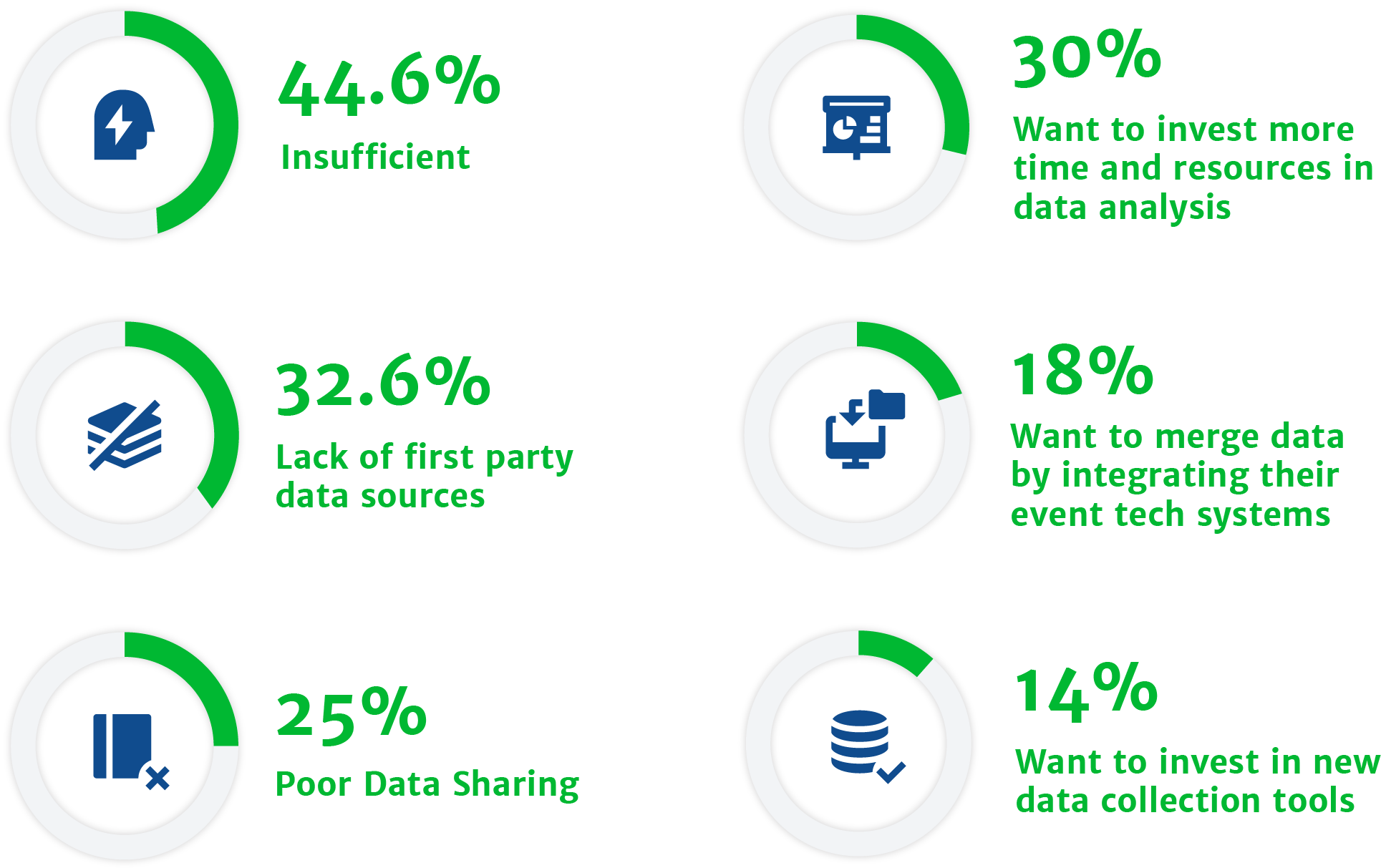
2. Digital Audiences at the Forefront of Events

Events are more than just the audience and activities at a physical place. Your event audience is still just as digital as it is physical, and that means making events revolve around both the physical and the digital. Calls to actions within the event space should harken to online actions like promoting and sharing the event with friends and other types of engagement CTAs.
This also leaves room for live streaming and media outlets to be let into the event space to report and showcase the event. It’s a great way to magnify your event to a larger audience, especially if it’s a widely international one. It’s getting more commonplace and affordable to get media partners to promote and showcase the event as it’s taking place, allowing those who could not be there to enjoy the event reporting as it goes.
As well post-event content is extremely necessary to extend the longevity of the event’s value to those who were both on the event floor or not.
3. Event Space Heatmapping
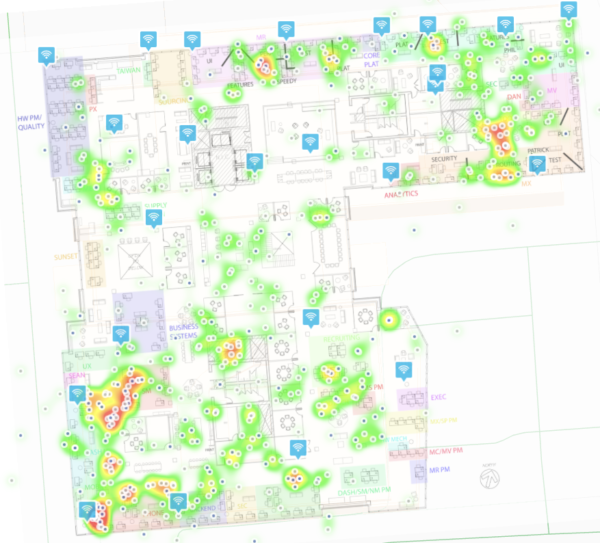
Event heatmaps have been a growing trend among larger events who can’t adequately analyze event floor foot traffic. By having properly mapped event floors or even better, 3D model, sensors and IR cameras in the rafters of event spaces collect and track heat signatures among the crowd over time.
By interlacing this heatmap data over a rendered or 3D model of the Event Space, it can become clear to event organizers what’s been going on at the event in terms of attendee foot traffic and interests. With this data, it’s easy to know where pain points are in the audience, where it might be overcrowded due to bad organization, or maybe there was a particularly interesting booth that caught audience’s eyes.
4. Virtual Reality at Events

Virtual reality is a growing trend among the entertainment industry and so very obviously it’s been a more visible function of some entertainment events. VR, however, has proven to be more functional than just an entertainment console, as its function in a lot of fields has proven to be quite useful.
It’s also a great way to attract attendees who want to see tech being leveraged at the event space and experience VR for themselves. It leaves a lasting impact on the attendee’s experience and it definitely draws a crowd. We have a more thorough guide on the Glue Up blog that gets into the nitty gritty details of VR for events.
5. Facial Recognition
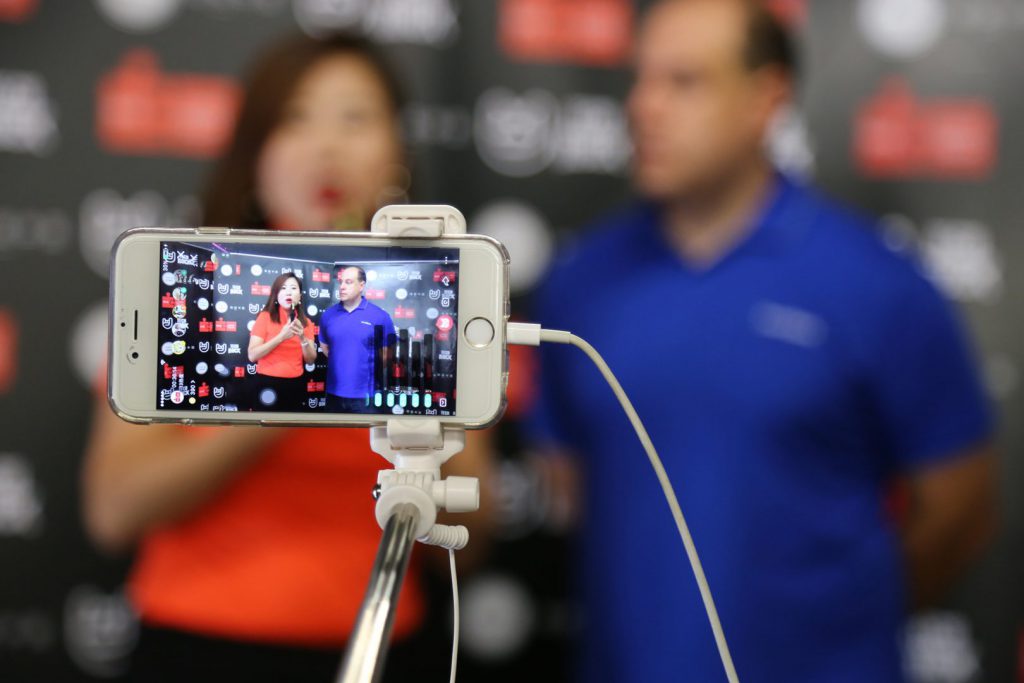
While privacy matters have taken a hold on some regions of the world, facial recognition is still an in-demand asset for events in others. Holding onto printouts, tickets, QR codes, and even the pain of downloading an app are tall requests to ask of an audience who simply wants to not wait in line to get into an event. Facial recognition is a great way to check in attendees, verify them, and all without requiring action taken by the registrant.
The privacy debate is still hotly contested in most western countries where it’s at the forefront of techno-sociology, however in areas like Singapore, China, and other more tech-progressive nations privacy is oftentimes secondary to technology progression, and Facial recognition is certainly not an issue for locals to enjoy a smoother check-in at events.
Without a doubt, this is one technology that will affect more than just events, but it’s also an inevitable piece of technology we will encounter at the check-in of future events to come.
Now Back to You
Event Tech is more than just terminology for simply having tech in an event. It’s a growing cause to make events as engaging and successful as they can be by leveraging new technology to do it. Events are one of the few times that online-offline activities meld together for the same purpose, and without technology to bring that gap closer, events could potentially stay in the dark ages.
If you’re looking to leverage tech that’s going to help with your event, here’s some tips when shopping around:
- Don’t dive too deep, tech gets invented and released to market faster and faster these days, so don’t take a risk on iffy products. Stay humbly tech-enthusiastic and use what’s currently working at other events to catch up, and then fill in the gaps with other tech.
- Create a full journey with tech and automation in mind. Without automating engagement, a 5000 person event can only hope to reach out to a few hundred in the post-event marketing campaign.
- Book demos. Event Tech is majority SaaS model products and that means you’re likely to get demos and free trial offers that can benefit your next event. This will give you time to experience it for yourself before you decide to buy.
- If traditional methods work better than the technological alternative, then use the traditional method. Sometimes audiences don’t respond well to new things, and if you notice that event tech is harming your audience’s experience, then it’s actually best to stay traditional in some areas. For instance, if audiences are reluctant to download a check-in app for the event, and that means moving them from one line to another at check-in, then it’s probably just best to save the app check-in line and just make it 2 name-list check-in lines and move people through faster.
Glue Up is clearly a move in the direction of Event Tech being a more familiar product like Salesforce, MailChimp, and all the other great tools combined into one. Without automation and integrations like this, there’s likely going to be continued headaches for management at events as audiences inevitably crave more engagement.
To learn more about Glue Up, Book a demo and see how it works! We’ll show you everything you’ll need to know and make your next event spectacularly valuable.

